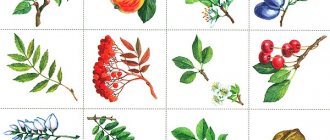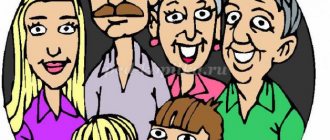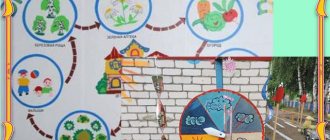Lesson summary "Introduction to ecology"
Topic of the lesson:
Introductory lesson. Introduction to ecology.
What is ecology? Date: ______________ Lesson time: 45 minutes Lesson form: practical lesson Control form: Interview
Goal: to form the concept of ecology as the science of relationships in the surrounding world; create an environment for students to study ecology with interest. Objectives: to introduce students to the concept of “ecology”; create conditions for the development of students’ cognitive interests; contribute to the formation of a caring attitude towards nature and positive personality traits. Equipment: questionnaire text, multimedia projector, indoor plant, environmental construction set, tape, sheets of white paper, quiz questions, “happy and sad” emoticons.
Preliminary preparation: conduct a survey of students participating in the lesson on the questions: What is ecology? Who is an ecologist? Is it easy to be an environmentalist?
Progress of the lesson: Organizational moment (quiet music sounds) Teacher: I hugged the globe - the globe, One above land and water. In my hands the continents quietly whisper to me: “Take care.”
The forest and valley are painted green. They tell me: “Be kind to us.” Don’t trample us, don’t burn us, take care of us in winter and summer.”
A deep river gurgles, caressing its banks, and I hear the voice of the river: “Take care of us, take care of us.”
I hear everyone from both birds and fish: “We ask you, man. Promise us and don't lie. Take care of us like an older brother.”
Hello guys! Together with me, today you will learn: what the science of ecology studies, who an “ecologist” is, what you need to know and be able to do to become a real ecologist-researcher. To do this, we will go on a short journey through the knowledge of this science. Well, let's begin!
Studying new material Teacher: The term “ecology” in our 21st century is very often used in the media. What kind of science is “ecology”? What does she do? I suggested that you answer this question before the start of our lesson. What answers did I receive?
(Read some answers to the questionnaire questions) Teacher: In fact, ecology is the science of the relationships of organisms with each other and with their environment. The term “ecology”, introduced in 1866 by the German zoologist Ernst Haeckel, is a combination of two Greek words: “oikos” - house, dwelling; "logos" - science, teaching. Figuratively speaking, ecology is the science of how to live in your own home. And what “house” did Ernst Haeckel mean when he gave the name to the new science? (student responses) Home is the nature that surrounds us. For some organisms, home is a tiny area of the environment, like, for example, a flower cup for an insect living in it; for others, it is a wide expanse of continents and oceans. You and I are also residents of this house. Do you know our “neighbors”? Now we will learn this from your answers to chamomile’s questions. (students tear off chamomile petals, answer questions) - In spring, flowers with a golden-yellow basket appear in thawed patches. After flowering leaves appear. The top side of the sheet feels colder to the touch than the bottom. Medicinal plant. (Coltsfoot) - There are lumberjacks on the rivers, in silver-brown fur coats. Other dams are built from trees, branches, and clay. (Beavers) - This tree is a special type of willow. He has fluffy, fur-like earrings. People bring branches of a flowering tree into their homes. (Willow) - What kind of grass is that even the blind can recognize? (nettle) - A bird whose drumming can be clearly heard in the spring in the Moscow region forests. (woodpecker) Teacher: Guys, let’s try to “populate” the landscape (“house”) with characteristic inhabitants using an environmental constructor. (students are divided into 2 groups, receive playing fields of an environmental constructor: a pond and a forest, cards with images of inhabitants who need to find a place in the depicted landscape) Teacher: You populated the landscapes offered to you with living organisms, but we didn’t place some of them anywhere? Who have we forgotten about? (student answers: we did not settle a person) Teacher: What place does a person occupy in nature? Let's turn to the film "Human Impact on the Environment." (students watch video clips about the life of our planet and human influence on nature) Teacher: we watched 2 video clips: an optimistic one (about the beauty of our nature) and a pessimistic one (about the negative impact of humans on the environment). You have “happy and sad” emoticons on your desks. Raise the “happy” emoji if you liked the optimistic storyline. And whoever liked the sad story about the results of human activity - raise the “sad” emoticons. (students raise emoticons) Teacher: Of course, we prefer to live in a beautiful and clean “home” - our nature. Can the well-being of our nature depend on us? (student answers: yes, it can.) Teacher: A person can act as a creator. At the same time, he plants trees, removes household waste, and does not pollute the environment. Environmentalists provide great assistance in this work. Let's remember your answers to the second and third questions of the questionnaire. (read out the students’ answers to the survey question: who is an ecologist? Is it easy to be an ecologist?)
Teacher: Today we have the opportunity to work in an environmental laboratory. By solving specific problems, we can understand the difficulties associated with the work of a scientist and experience the joy of discovery. According to V.I. Vernadsky: “Scientists are the same dreamers and artists; they have no freedom over their ideas; they can work well, work for a long time only on what their feelings lead to.” Today you have to draw a creative drawing “What is ecology?” Consolidating what you have learned
Teacher: Today during class we just touched a little on the science of ecology and tried to feel like young nature researchers. And how much you listened to me attentively, I will find out thanks to the quiz. (students answer questions)
Quiz questions:
Where do environmental researchers go to study the environment? (expedition) A scientist who introduced the term “ecology” into science. (Haeckel) A living organism that most often negatively affects nature. (Human) A room with special equipment for environmental research. (Laboratory) What does the Greek word “oikos” mean when translated into Russian? (house) Translate the word “science” into Greek. (Logos) Teacher: Guys, A.S. Can Pushkin be called an ecologist? (Students answer the question. Answer: “The fairy tale is a lie, but there is a hint in it, a lesson for good fellows.” What does Pushkin’s fairy tale about the goldfish hint at? The fish is Mother Nature, kind, wise and strict. And the old woman is an extortionist - this is a modern person. The lesson is that you need to be able to limit your needs so as not to be left with nothing...) Teacher: Being an ecologist is not easy, but interesting. In the classes of the World of Ecology association, we learn to understand nature, we learn to be its friends, because we choose the role of a human creator in nature. Music is playing. On the screen are slides of beautiful nature, activities of young researchers on expeditions and field laboratories. Teacher: Look, my new friend, What is around: The sky is light blue, The sun is shining golden. She: The wind plays with leaves, A cloud floats in the sky, Field, river and grass, Mountains air and foliage. Birds, animals and forests. Thunder, fog and dew, Man and the season - It's all nature around. Oh, how tolerant and kind mother nature is, but so that her dashing fate does not befall her, let's keep the sturgeon on the rods, the killer whale in the sky, and the tiger in the taiga wilds. If we are destined to breathe the same air, let us all unite forever. Let's save our souls together, Then we on earth will be preserved ourselves. Thank you for your attention, see you soon in classes at the World of Ecology association





